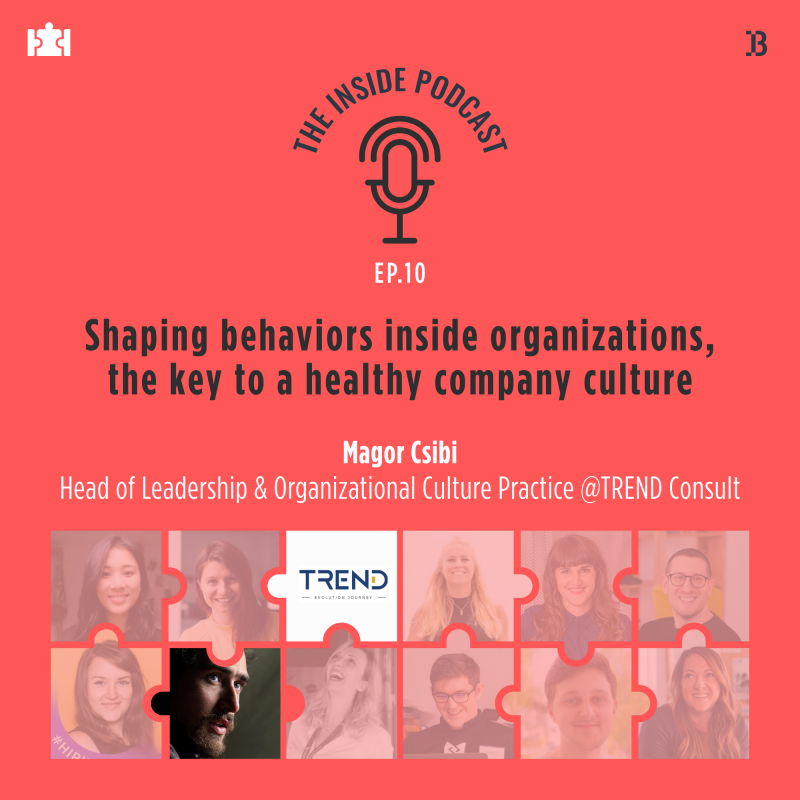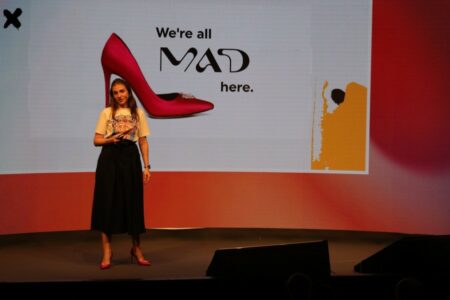Overview: Shaping behaviors inside organizations – the key to a healthy company culture
In Ep. 10 of The Inside Podcast you’ll be listening to Magor Csibi, Head of Leadership and Organizational Culture Practice at Trend Consult Group. Magor shares key insights into what exactly makes a healthy company culture – “Culture is like a waterfall. It’s coming from the top and it’s cascading down. So it’s very important that the leader be the owner of the whole process. It cannot be in any other way.”
What you’ll learn by listening
- Company culture: what it is, what it isn’t
- How to frame real company values
- Good behaviors vs. toxic behaviors in organizations
- How measuring & enabling emotions leads to a healthy organizational culture
- WHO is the owner of the culture inside an organization & WHY
About the company
TREND is a Romanian entrepreneurial company, which started without an initial investment, relying solely on the efforts of those who founded it in 2000. The orientation towards innovation and the openness to create something new, starting from their customer requests, helped TREND evolve together with them. All its history is about people (colleagues, customers, or international partners) and their courage to grow together. To customers, TREND offers complex solutions including consultancy, training, events, and digital in five key areas: sales, customer care, team culture, leadership, and personal development.
Enjoy listening to Ep.10 of The Inside Podcast on Spotify!
Podcast transcription – Behaviors & company culture: tips to a healthy organizational culture with Magor Csibi @Trend Consult Group
Georgiana Ghiciuc: Hi, everyone! This is Georgiana and you’re listening to The Inside Podcast where people from various tech companies share their insights into what it’s like to be a tech talent manager, a recruiter, or an employer branding manager. Today I’m talking to someone who is somewhat at the confluence of all these areas. Magor, welcome to our podcast today. Your role is Head of Leadership & Organizational Culture Practice at Trend Consult Group. What does your work entail exactly, on a daily basis?
Magor Csibi: It involves a lot of things, but mostly my role involves working with leaders in order to help them to transform their culture inside the organization. It may look like something complicated, fancy stuff to do. But in simple terms, what we’re doing is modeling behaviors inside organizations or helping leaders better shape behaviors. And I believe this is very important because as individuals and as organizations, we have a lot of automation. That being said, our behaviors and routines are not the results of our critical thinking, not even the result of thinking. This is why it’s so important to make ourselves aware of the patterns inside an organization but also inside our own minds.
Georgiana Ghiciuc: That’s true. And I remember discussing this topic with you at some point in one of our meetups to which you were a guest. And at that point, we discussed the difference between company culture FIT and company culture ADD. You know I’m a marketer, so I’m not a specialist in HR. Is there a real difference between all these terms? Or is it all just noise, so to say?
Magor Csibi: In general, corporations have the tendency to invent a lot of words. This way, it means that we are always creating, coming up with new ideas and new solutions. But if you look into what’s happened inside organizations 2000 years ago and then you come back to today, I do think that the behaviors and the patterns have remained the same. We are just learning to play with words and that is very important. Apart from playing with roles and coming up with notions that many people don’t understand and apart from making ourselves very clever when standing next to others who don’t understand the problems we’re talking about, it is important to be as simple as possible.
All of these words are creating somehow natural pollution. And that’s because we’re not thinking about issues but about concepts that are somehow mesmerizing our imagination. Things are very simple and very clear, so we should focus on what happens with people, what they are thinking, how they are behaving. If you’re not looking for these acronyms, you will see that the variations are not as big as we would imagine.
Georgiana: Okay, that’s comforting for me. It means I’m not totally lost. Who would you say should take care of company culture and the brand of the employer – marketing, human resources, management, all three of them?
Magor Csibi: If we’re talking about culture, the owner of the culture is always the leader of the organization. For instance, if I have a meeting with a head of HR or the HR director, if I meet somebody from marketing and they’re saying to me, “Come on, let’s talk about culture”, the leadership of the company is behind us. I always say, “Yes, I understand that, but culture is like a waterfall. It’s coming from the top and it’s cascading down”. So it’s very important that the leader be the owner of the whole process. It cannot be in any other way.
When we are talking about organizational culture, the biggest issues are related to the leaders who are not leading the values of the company; they’re not leading the aspirational values, they’re not planning for themselves. This way, no matter how much we’ll be working with an organization, it’s always the work with the leader who comes in. At one point I was leading an organization, and I actually met with the founder of the company Trend Consult. And he said he had a few solutions for my organization. He said, “I can work with everybody in the organization. I can work with anybody in the organization and you. And I can work only with you”.
I wanted to know straightforwardly which was the best solution for me. He said, “If I work with you, I don’t need to work with anybody else”. It was a very diplomatic way of saying that the leader is the one determining the behavior of the people. He is the one shaping the company culture first and foremost. If the leader is not behaving, and not representing the values of the company/organization is declaring, it’s very hard to make the people behave in a different way. What I see in the corporate world is that branding is usually hand in hand with the marketing department. But I disagree because most of the time, marketing comes up with the idea of how we want to be perceived by others.
We are declaring values like how we want to be perceived by others. This basically implies that we’re not leading. We’re not expressing our value, and I would further pinpoint that corporate branding is about what 1-2 people in the organization say about that organization. No matter what you are saying in a fancy magazine, or in a TV ad or whatever – those are not the values of your company.
The values of your company are defined by your day to day experiences. It’s much more important to look at your people and ask them how they feel. After that, you can come up with values.
magor csibi
Georgiana: Do you believe in the power of the survey? Or should you ask people just on a one to one basis? What’s better?
Magor Csibi: Culture is not something mythical. It’s not something you feel in the air. Corporate culture can be broken down into behaviors. And we can determine which are the most frequent behaviors of the people. We can also improve those behaviors towards the desires and goals of the company. I would say it’s not something emotional; it’s a very measurable thing. If the culture is right, the emotions in the company are also right. I do think that emotions are somehow very relevant.
Magor Csibi: Culture can be measured at any time. I do believe that measuring is important, not necessarily via surveys. Surveys are one way of measuring, but there are many ways of measuring. From time to time every company should check how the culture is doing, or what are the behaviors or how people feel in the company. Otherwise, you are creating scenarios in your head. And you’re searching for clues to validate what you’re thinking every day.
I always encourage leaders to find scientific ways to make decisions when it comes to people. If you know what you want from the organization, you know what are the behaviors that took you a step closer to attaining your goals. You should also pay closer attention to toxic behaviors because they can make the process of achieving your goals a bit harder. If you can clearly separate the desired behaviors from the toxic behaviors, from there it’s very easy to assess the way you trigger emotions. How am I causing behaviors, what are the main drivers. This way you can intervene in a very calculated way into the decisions.
But human beings are emotional beings. And each time we say to ourselves that we are making rational decisions, it’s a narrative that we’re telling to ourselves. We are always making things up in our minds based on emotions, based on what we’re feeling. This is what everything is about emotions. But again, emotions can be measured and can be enabled.
Georgiana: Okay, my next question is: People don’t change jobs, they change managers and leaders. Can you think of three things leadership can do in order to facilitate company culture adding?
Magor Csibi: I would say that one of the first things is to make it very clear to yourself as a leader what is the mission and what is the vision of the company. Many times I see in companies that the leaders do not have their own story right. They do not know what exactly is the story of the company. “Why are we doing what we are doing every day?” This is that important because if you do not know your own story, it’s very hard to motivate people, especially younger people who are not driven by financial gains, or policies. They’re mainly driven by the mission, by the stability of our company.
If you don’t give people something to believe in, it’s very hard to create a culture first. Second, you need to determine what kind of culture you want. What is the culture of your organization that is enabling the behaviors, that takes your organization closer to your goals. Many times we imagine how we want people to be in the company. But it’s not based on what we want to achieve. Sometimes the leader can be very uncomfortable with some behaviors, and still build a very successful organization.
I used to feel very uncomfortable giving straightforward, honest feedback and receiving straightforward and honest feedback. I was used to avoiding difficult conversations. For you, as a leader, it might be very uncomfortable to have a culture based on difficult conversations, but for the organization and for the culture it can be very beneficial. This is what you need to clarify how the culture needs to look like to attain results. And then define values and figure out whether or not those values are in line with the corporation or the organization.
Too many times we remain at the wrong jobs. We tell ourselves that we should enjoy what we’re doing. But what if I don’t? If you don’t enjoy a position at a job, the things that you really believe are not the things the company believes in. Sooner or later, it will become very hard for you to motivate yourself and when that happens, you cannot motivate people.
The absolute most important thing for a leader is to walk the talk.
magor csibi
We are somehow displaying some behaviors and everybody believes that we are in a certain way. But everybody knows when someone is pretending. Nobody says it, but everybody knows it. By pretending, you will build a life and a career around pretending, meaning that you will end up unhappy, the organization will be unhappy, and in the end, nobody will learn what are the behaviors that you want to get together. The basic human instinct is to fit in. Don’t search to fit in, search to belong. Search for an organization, for a place, for a leader, for people who don’t need to behave, who don’t need to force themselves into patterns to become part of the organization. If you find a place that makes you feel you belong, stay there.
Georgiana: That’s true. I totally agree. In your role as a consultant, I think you’ve probably come across various company cultures and management styles, management mistakes, what is the one thing you’ll never forget that you would list as a definitive “NO” when it comes to company culture?
Magor Csibi: One of the most definitive experiences that I had – and I’m talking right now from my perspective as a human – is to have managers or leaders pretend to care about you, when in truth they don’t. It creates such a confusing mess in your head and that fact alone makes you wonder “Am I doing something wrong? Am I enough? Am I good?” And you can never know for sure because their behavior, or the display of their behavior is always positive and friendly.
But you feel that something is not right, that there is no real interest. I do think that every human being – regardless of circumstance, personal or professional – wants to be appreciated. But when appreciation is missing and you have a manager who pretends to do all these things, when in fact they know that it’s just pretend, it’s very disturbing. I had leaders, I have seen leaders, and I have worked with leaders who didn’t have any kind of understanding of basic emotions. It was easier for me to work with them than with the people who were pretending to have emotions. They didn’t truly care because they were doing only what it was expected of them.
Pretending, in general, is destroying relationships; it makes it harder for organizations to achieve their goals. When we talk about authenticity, authenticity is not something fluffy. It’s sometimes real because people can be awkward and that can be perceived as aggressive. When you learn to see the full dimension of a human being, you start to create relationships. As people in organizations, we say to ourselves that we are in organizations because we need to leave and we need that paycheck and so on. But if you don’t have that feeling of comfort, you will have a hard day. For a big part of my life, I was totally convinced that there’s no such thing as an ideal workplace. And this is the narrative that you tell yourself because you didn’t have the chance to see that there’s a better way of doing things.
When you see a culture that works for the very first time, you sit down and say “Whoa, and I was wasting my whole time, I was wasting my life pretending when the real deal is always somewhere”. I would say organizations are becoming tired of pretending and some are starting to encourage openness; especially the newer ones, the smaller and more agile organizations and the ones that are growing faster every day.
Georgiana: Okay, to change the direction a little bit, what has been a very influential movie for you?
Magor Csibi: One of my favorite movies is “Any Given Sunday”. I’ve seen it like 15-20 times. I never understood why, but I loved it when the leader says to himself that he knows better. You see a focus formation throughout the movie, and at the very end, the leader changes his way. He realizes that he needs to grow, that he cannot know everything, that his ways are not always the best. And he makes a radical change in his life. This should be the key of life, the key to any kind of career – you never have the right answer.
You should always be open to search and learn new things because the moment you think you have the answer, that’s the definitive moment you really look at things. When you start to think about yourself and about the fact that you hold the answer in your hand, it means you stopped believing in the learning process; you stopped growing and you should start asking yourself some really uncomfortable questions. This is what the movie shows us – that we should stop saying that we know better.
You cannot be a nice guy for five years and for one year act like a jerk. In life, it’s not like that. If you really want to be a nice guy, you always have to be a nice guy. And you always have to behave in a certain way. It’s a continuous process and a choice not a request or an expectation. You don’t have to be a nice guy. Many people I meet with don’t know how they are. To learn more about oneself, there’s therapy, coaching, reading, and numerous other things that can help you find your identity. The sooner you search, the better. Sometimes we are so focused on the world around us that we forget to spend time with ourselves. Let’s look a bit at what we like and what we don’t like now, because it will be very traumatic to ask yourself “Who am I?” at 60 or 70.
Georgiana: Okay, that brings me to my last question actually. And here it goes: Everything is cultural. So company culture is probably as well. What do you think is the one constant element that each company, regardless of where they are located, could take into consideration for a harmonious corporate climate? I’m really curious about that.
Magor Csibi: I would say that harmony is not necessarily part of the culture. For instance, in a company where everyone expects you to learn all the time, it may not be harmonious all the time. Sometimes it can be uncomfortable, but the climate is the one that can be harmonious. Culture can be healthy and a healthy culture leads the behaviors of the people. I think that everyone in every organization must understand that even if you’re totally not interested, even if you’re not investing, culture is always there.
Once you accept that you have an influence or you can have an influence over your culture, you can measure it, define it, and style it. When we don’t like our climate, we tend to ignore it because it’s uncomfortable. As a leader, you see you don’t have a good culture and you often look in other ways; you look at the results, you look at charts, you look at charts, Excel tables. But in the end, behaviors will determine the results.
How people behave will decide if the company is successful or not. The longer you don’t pay attention to the behavior of the people, the longer you’ll wait for results. If I look at the numbers, numerous leaders and managers don’t have the time to look at the behaviors. They bury themselves in strategic overviews, ignoring the big problems. If you don’t know how the people in your company are really behaving, you will start imagining behaviors. And if you imagine what people are doing around you, you will make plans for that imagined behavior, things will go wrong. If your planning is wrong from the very beginning, the achievements will be even less until you understand what people are doing in your organization. That should be your focus. Be interesting, be open!
Georgiana: Which is good advice to apply in every relationship, right?
Magor Csibi: Absolutely. I read a lot of books on relationships. And most of the books say that you just need to sit there and listen to the advice. I’m just sitting there and listening and not saying anything. There’s no value until you start to practice. And then you realize that most people don’t want your solutions. They want your interest.
Georgiana: I agree. Well, yes, I think there’s a lot that can be said about it. But unfortunately, our podcast has reached an end. Thank you very much Magor for your input. Everyone, I strongly suggest that you follow him on LinkedIn, there’s a lot of useful information that he shares on his profile. Congratulations for that! I really think that you have a way of stating things and of providing information that’s really to everyone’s understanding. And I think you’re doing a lot in shaping people’s minds in a way, when it comes to company culture. I know I’m learning a lot from you. So I’m definitely a true fan. Once again, thank you for joining me.
Thank you for listening to The Inside Podcast. You can find our podcast on Spotify and on Apple Podcasts. And if you want to read more on employer branding or digital marketing content in general, go to beaglecat.com or employerbranding.tech. See you next time! Bye!






